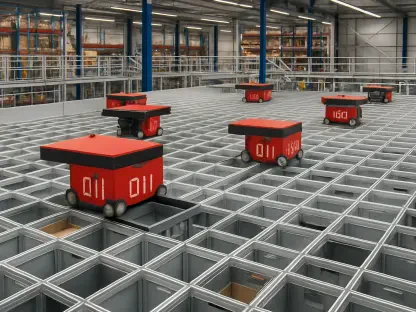Setting the Stage for Retail Logistics Dominance
In today’s hyper-competitive retail landscape, where global eCommerce sales are projected to surpass $7 trillion by 2025, the backbone of success often lies in seamless logistics. Imagine a premium British tea and coffee brand striving to meet soaring demand across continents while maintaining an impeccable customer experience. This is the challenge faced by Whittard of Chelsea, and its solution comes through a strategic alliance with Wincanton, a leading logistics provider. This market analysis delves into how this partnership is shaping Whittard’s growth trajectory in both UK and international markets. By examining key trends, operational data, and future projections in retail logistics, the focus shifts to understanding how such collaborations redefine scalability and customer satisfaction in a dynamic sector.
Decoding Market Trends in Retail Logistics Partnerships
The Surge of eCommerce and Logistics Integration
Retail markets are witnessing an unprecedented shift toward eCommerce, with online sales channels becoming a primary growth driver for brands like Whittard. The demand for rapid, accurate order fulfillment has pushed logistics providers to evolve beyond traditional warehousing. Wincanton, operating from its state-of-the-art DC7 eFulfillment center in Northampton, exemplifies this trend by achieving a picking accuracy of 99.99% and an outbound eCommerce order accuracy of 99.5% in recent metrics. These figures highlight a market where precision is non-negotiable, as even minor errors can erode consumer trust. The integration of advanced technology in logistics operations is no longer optional but a critical differentiator for retailers aiming to capture market share in a crowded digital space.
Tailored Solutions as a Competitive Edge
Beyond standard delivery models, the retail logistics sector is trending toward customization to meet brand-specific needs. For Whittard, Wincanton provides bespoke services such as personalized tea blending, custom packaging, and gift orders with handwritten messages, catering to a premium customer base. This level of specialization reflects a broader market movement where logistics providers are becoming extensions of a brand’s identity. However, the challenge lies in balancing tailored offerings with operational efficiency, as over-customization can strain resources. Still, in a market where differentiation is key, such personalized logistics solutions are increasingly seen as a pathway to building customer loyalty and enhancing brand value.
Navigating Global Trade Complexities
International expansion remains a cornerstone of retail growth, yet it introduces a maze of compliance and regulatory hurdles. The logistics industry is adapting by prioritizing expertise in cross-border trade, a strength Wincanton leverages for Whittard through managing certification requirements and multi-carrier delivery networks. Market analysis indicates that retailers who fail to address these complexities risk delays and penalties, stunting their global ambitions. Wincanton’s proactive approach positions it as a vital player in a market where understanding regional standards is as crucial as physical distribution. This trend underscores a growing reliance on logistics partners to act as navigators in the intricate web of international commerce.
Data-Driven Insights and Future Projections
Operational Excellence Underpinning Market Growth
Analyzing current data, Wincanton’s operational performance offers a glimpse into the potential for sustained retail expansion. Handling both business-to-consumer (B2C) and business-to-business (B2B) fulfillment for Whittard, the logistics provider ensures efficient stock distribution to UK stores and international wholesalers. Such reliability is pivotal in a market where supply chain disruptions can cost retailers millions in lost sales. Projections suggest that by 2027, logistics providers achieving near-perfect accuracy will dominate partnerships with premium brands, as consistency becomes a benchmark for success. Wincanton’s metrics set a high standard, indicating a future where operational excellence will drive competitive advantage.
Innovation as the Next Frontier
Looking ahead, the retail logistics market is poised for transformation through technological advancements like automation and AI-driven inventory management. These innovations promise to further enhance fulfillment speed and reduce costs, areas where Wincanton is already positioned to lead for Whittard. Market forecasts predict a surge in demand for sustainable logistics practices, with eco-friendly shipping solutions expected to influence consumer preferences by the end of this decade. Adapting to these shifts, partnerships like this one could pioneer green initiatives, aligning with evolving market values. The emphasis on innovation signals a future where adaptability will separate market leaders from laggards in retail logistics.
Economic and Regulatory Influences on Strategy
Economic factors, including fluctuating shipping costs, alongside regulatory changes such as post-Brexit trade agreements, are reshaping the logistics landscape. Retailers and their logistics partners must remain agile to mitigate risks associated with these external pressures. Projections indicate that from 2025 to 2027, the market will see increased investment in compliance expertise to navigate such challenges. For Whittard, Wincanton’s ability to manage these variables ensures uninterrupted global reach. This trend highlights a broader market need for logistics providers to offer strategic foresight, positioning them as indispensable allies in retail expansion amid economic and regulatory uncertainty.
Reflecting on Strategic Implications
Looking back, the partnership between Wincanton and Whittard provides a compelling case study of how logistics underpins retail success through precision, customization, and global trade mastery. The analysis reveals that operational reliability and innovative solutions are central to meeting the demands of a competitive market. Moving forward, retailers need to prioritize scalable logistics partnerships that can adapt to technological and sustainability trends. A recommended step is to conduct thorough audits of existing supply chain frameworks, identifying inefficiencies and aligning with providers who offer both accuracy and strategic vision. Additionally, investing in compliance know-how proves essential to avoid international pitfalls. This collaboration sets a precedent, demonstrating that the right logistics alliance can transform challenges into opportunities for sustained growth in the ever-evolving retail sector.









